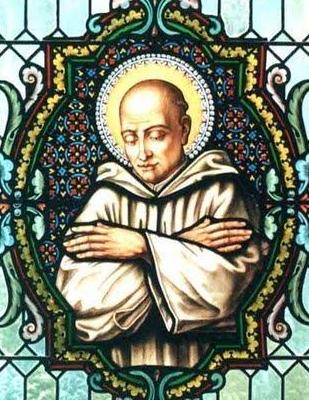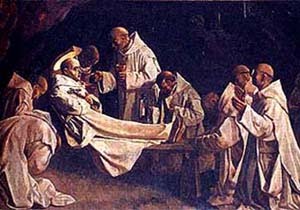 From the Museo della Certosa is the Italian publication titled, ‘I Colori del Silenzio’. And in that publication is a loving tribute to Holy Father Bruno. It is shared here at Secret Harbour, on this day where around the world the Carthusian Order celebrates the Solemnity of Saint Bruno.
From the Museo della Certosa is the Italian publication titled, ‘I Colori del Silenzio’. And in that publication is a loving tribute to Holy Father Bruno. It is shared here at Secret Harbour, on this day where around the world the Carthusian Order celebrates the Solemnity of Saint Bruno.
(My translation)
There are lives, my God, which may be approached only with respect, holy grounds where your mystery shines. No one can contemplate them without being enlightened by you, no one can find them without being inflamed by Your Spirit.
6 October 1101, Sunday, at the Hermitage of
Santa Maria della Torre in Calabria, Italy there were some monks, and in the midst of them a man laid down. Tears were in their eyes and choking cries in their voices. The guide of their souls, their father . . . had reached the time of his birth into eternity. This man is you, Bruno. In this instant, your whole life, more than seventy years, is in your heart, the final offering to the Father.
Behold your first years in Cologne, where you were born, your departure for Rheims in France, that great and celebrated school of theology, your scholarly enlightened intuitions, and your appointment as canon of that church. The face of Archbishop Gervais, his decision of promoting you, at the early age of twenty-eight, to master of the most celebrated school of this time; students from all over Europe flocked together to listen to you, as your fame continually increased; then came the archbishop’s death in July 1067.
Behold the newly elected Manasse, his greed, his rages, the first discords, the increasing disorder, the scandals, while the Church reforms herself thanks to the Holy Father, Gregory VII; your sufferings, and the firm decision to voice your displeasure of the papal Legate. In the final months of 1076 came the retaliations of Manasse, depriving you of all your charges and goods – leading to the way of exile, a long and painful fight which lasted four years. At last the decision of the Pope: to depose, to dismiss the bishop from his See, while all eyes looked upon you to be the successor. But . . . in the silence of your heart, suddenly, another Heart! Your exile was the first stage of a long interior pilgrimage.
Behold the call of Christ: to leave everything so as to follow Him, to resume the way of the first fathers of the desert; the astonishment of all, the admiration for you, the light of Rheims, who was already fifty-five years old; then
Sèche-Fontaine, the first attempt at solitary life with two other monks, but soon they defected and you searched for a second hermitage.
Behold your new companions: Landuin, two men named Stephen, and Hugh; these four were clerics, and with them were Andrew and Guérin, the first lay brothers. Their faces are still now in your heart, your brothers so beloved. And all seven were united as the flames of the archangels before the Almighty. You asked Hugh, the holy Bishop of Grenoble, for a place to live, hidden in God. Hugh of Grenoble was a friend of your heart. He helped you immediately without reservation; he had a dream about seven stars that guided him into the desert of Chartreuse to glorify God.
On June 1084, nearing the feast of Saint John the Baptist, you arrived at the place foreseen in the dream, to begin a great adventure still unknown. Behold your monastery, lost in the mountains, the first years, the ascetic struggle, the peace of the Spirit. Such fire in your souls, such love in your hearts! You, Bruno, already possessed pure praise and cries of amazement: ‘O Bonitas! O Bonitas!’ (O the Goodness! O the Goodness!).

Six years of toils, six years of joy; God, God, God always, only God, together with your brothers! Then, unexpectedly, the trial . . . In the first months of 1090 a courier of the Pope arrived with this message: Urban II, a former student of yours, calls you to his service at his side. The sun sets, it is night. Leaving everything, abandoning all, again, undoubtedly forever, your solitude in God, that blessed solitude, your companions of life, your friends. But in your heart, the ‘yes’, which is your love for God and for the Church. But the tempest overwhelms your brothers, the bewilderment takes them, and they disperse. To be without you, the master, the star of the journey: How could they? This way is so difficult. Everything collapses. Everything! Your heart is on the cross. It is the hour of your passion. Has the beautiful adventure reached its end? ‘My Father, if it is possible, let this cup pass me by! Yet, not my will, but Yours be done’. The sky opens, a new day is born. Your brothers again gather in the desert guided by Landuin. Your soul is suffering less, Bruno, at the hour of departure.
Behold Rome, the holy city, the heart of Christianity! But Rome is threatened. Shortly after your arrival, the Emperor Enrico IV and his protected, the antipope Clement III, launched their troops towards it. Urban II and his court fled to the south, near the land of the Norman allies. And still another trial: the Holy Father offers you the archbishopric of
Reggio Calabria. What were you to do, Bruno? This is such a difficult time for the Church, as a brilliant future opens up for you – a counsellor for the Pope, a trustworthy man, admired by all. But in your soul still resounds the call, continuous, powerful, captivating, even stronger in the splendour of this court: Only God! Only God! To be His, completely His, only His, together with other brothers! Only God! Your heart, a cry of love for Him! Father, will You forget Your son? It is You Who has sown the cry in him . . . Bruno, the Lord responds, Urban II blesses your vocation: yes, you may resume your solitary life. ‘O Bonitas! O Bonitas! My life and my all, my beloved forever’. (Autumn of 1090).
Your heart would like to return to Chartreuse, to find your brothers. But the Pope asks you to stay in these lands and you accept his words as those of Christ. But where to dwell? A friend of the Holy Father, and soon to be your friend, Count Ruggero, offers you a vast desert territory. Behold your hermitage,
Santa Maria della Torre, in the woods of the
Serre, and the arrival of new companions, and later others, and yet more, up to thirty-three new sons. Nearby the hermitage stands the monastery of Saint Stephen where the lay brothers lead more a life in community; Landuin guides them, your faithful friend.
Eleven more years, eleven years of hard work and asceticism, eleven years of light and joy in praise, here, in this rich land of monks and hermits, whose history is blessed with their presence. And so, that your joy may be complete, Bruno, one day found the happiness of a visit: Landuin, who brings with him the love of your first sons, and their fidelity. ‘O Bonitas! O Bonitas’! -- so as to accept this friend of yours in this land that fills your heart, with an embrace and a gaze.
The autumn of life nears the end and your eyes rise towards eternity. Two years have passed since Urban II left this world; a year later, on his return journey, Landuin dies professing the faith in the prisons of the antipope; three months before that, in June, Ruggero died. Bruno, heaven calls you. Now . . .
The breath becomes briefer, perspiration bathes you, with your last brothers, you proclaim your faith, a hymn to the Trinity. The instant is near, time opens. Bruno, look at this grand light, so immense: ‘My Lord and my God’.
‘It is Me My friend, come! Enter into My Heart. Come! Come’.

‘O Bonitas! O Bonitas’!
Bruno, stay with us!
‘I will remain in your hearts’.
Everything stood still. Silence freezes us in its density. Fire has consumed the last twigs, the flame has vanished. Bruno . . . your face is so beautiful, illuminated by peace; and your eyes, open towards heaven, are overflowing with an infinite tenderness. A hand closes them in the ultimate sleep. Your life is hidden in Him, for all eternity. Fullness of joy! Ocean of love!
But your light still shines in our hearts and in your two letters, for your friend Raoul and your brothers of Chartreuse, who will bear witness forever to your mystery. You are so present in them, your profound humanity, finesse, your sweetness and goodness, your harmony throughout, your wisdom, all tenderness and humility, spiritual joy, simplicity -- Bruno, all-burning with your love of God, and the God-Love in you.
Yes, you are alive forever. And, like a planted seed, from you will rise a tree where different birds will make their nests. Are you not seeing it in the Eyes of God?
A life-flame of prayer still consumes itself roundabout you, Bruno; it burns in this place from where now you fly towards heaven, so as to make descend from there a great light of melody and love. Together with the first, behold all your sons and daughters, throughout the centuries, until this day and even further, all of us who, invisibly are around you on this 6 October, in this instant of your great birth, Bruno . . .
 First Reading, Wisdom 11:22-12:2
First Reading, Wisdom 11:22-12:2


























